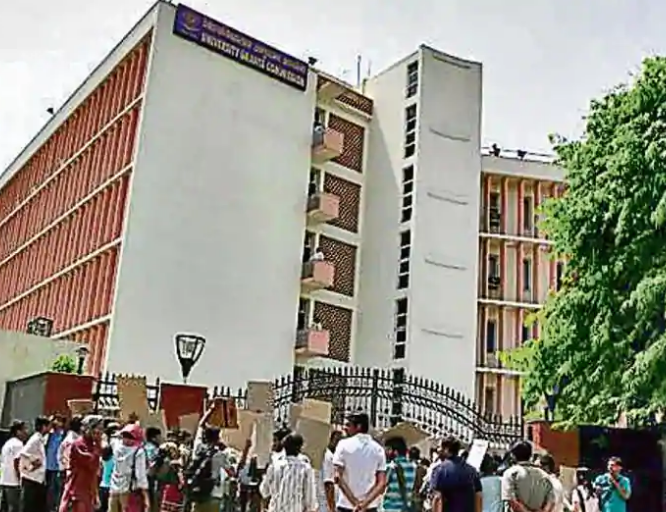Teachers and Students March in Delhi Against Casteist 13-point Roster System

Image Coutesy: Hindustan Times
“The government is doing injustice to us. This move is to completely push out the students from reserved categories, while on the other hand, they are giving a 10 per cent reservation to the upper castes. This is the best example of the caste ideology that dictates the politics of BJP,” said Vidya, an M.Phil. scholar from Delhi University, and a first-generation learner. She, along with thousands of teachers, students, and research scholars from several universities, marched from Mandi House to Parliament street, Delhi, demanding that an ordinance to restore the 200-point roster in faculty recruiting be brought out.
The protesters expressed concerns about how the department-wise or the 13-point roster will affect the institutions and will drastically reduce the number of posts under the reserved categories. Vidya added, “The previous 200-point roster system was very inclusive in nature. The new system is straight out exclusion. We are being treated as second-class citizens under it. I, being a first-generation learner, know that if I don’t protest today, I won’t be able to move ahead, and acquire the education that I want.”
Rajib Ray, the president of Delhi University Teachers’ Association (DUTA), told Newsclick, “If the government does not immediately bring back the 200-point roster system, there will be a disruptive situation in all the colleges of Delhi University.”
He also said, “The temporary and ad hoc teachers in the university are only recruited for four months at a time, and upon completing the period, they are recruited again. After the implementation of the new roster, the nature of these posts will change, and it will affect the recruitment of the teachers.”
Also Read: Teachers Unhappy With SC’s Decision on Reservation in Appointments
Talking to Newsclick, Apeksha, a PhD Scholar from JNU, said, “The essential question that we need to ask this government is that if they really are for the oppressed, then why haven’t they released the caste census till date because the moment the cast census will be released, the proportions of oppressed classes in the population will be revealed, and the sections that have not received the basic amenities like healthcare, education, and any public administrative benefits will also be revealed. And then people will realise why this 10 per cent reservation is a farce, because at the end of the day, the poorest are also coming from the most oppressed castes, which is why this just an eyewash.”
Under the 200-point roster system, the entire college or university was taken as one unit, across which the reserved seats were distributed. It was ensured that out of every 200 posts, 99 posts remained reserved for SC, ST, and OBC communities, and 101 posts were unreserved. This made sure, provided that 200 appointments were made in the entire college or university, all reserved categories were given earmarked number of seats across various departments. This system meant that a deficit of reserved seats in one department could be compensated by more people from the reserved communities in other departments, therefore ensuring constitutionally mandated reservation.
In April 2017, the Allahabad High Court said that the 200-point roster system was faulty, and implemented the new 13-point roster. Under this new system, instead of the entire college or university, each department was considered as one unit, and posts were reserved by taking into account all teaching positions – professors, associate professors, and assistant professors. According to the court, the previous roster could mean that distribution of reserved positions would be uneven across departments, resulting in some departments having all the reservations, and some departments only having unreserved candidates.
Also Watch: 'VC Must Go!' - Teachers Refuse to Tolerate Attacks on Public Funded Higher Education
The Centre was not given leave to appeal the High Court ruling. The University Grants Commission put out a notification in March 2018, directing the use of the 13-point roster, taking each department as a unit. Under the 13-point roster, the first, second, third, fifth, and sixth posts will be unreserved in a department, while the fourth will reserved for OBCs, the seventh will be reserved for SCs, the 14th posts will be reserved for STs, and the eighth and 12th for OBCs, while the ninth, 10th and 11th will be unreserved. This roster is made by dividing 100 by the percentage of reservation granted to a particular group.
Get the latest reports & analysis with people's perspective on Protests, movements & deep analytical videos, discussions of the current affairs in your Telegram app. Subscribe to NewsClick's Telegram channel & get Real-Time updates on stories, as they get published on our website.
























